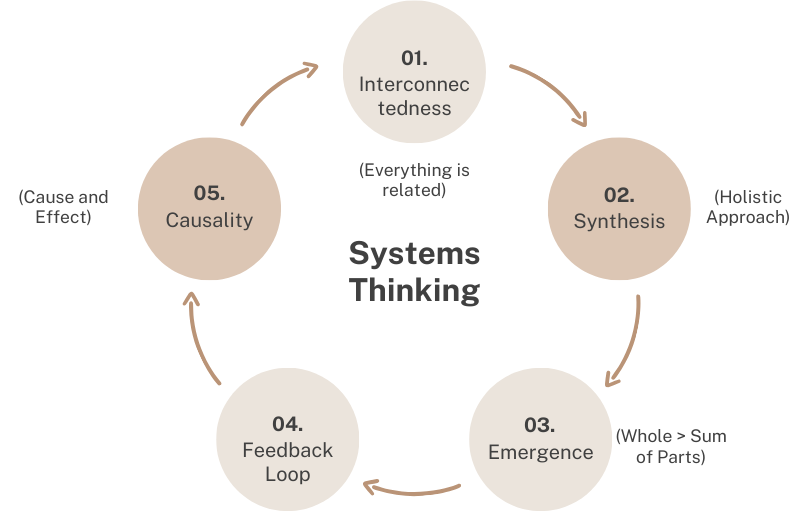Systems Thinking: A New Perspective on Purpose-Driven Initiatives

We live in a time where sport has transcended mere competition and become a transformational catalyst for positive change. Concepts and frameworks from other disciplines are now making their way into the sports industry and proving their worth.
One such concept is Systems Thinking.
Systems thinking is an approach that recognises different parts of the whole and appreciates these components' relational aspects. The traditional segmentation approach teaches us to break the concepts and look at them separately.
However, to create a global impact, it is a must to look at a different strategy. Looking at everything in the world from a relational lens helps organisations move away from the siloed mindset to a more collaborative one.
Key Concepts
There are five key concepts involved in a systems thinking approach. Let's look at them in the context of purpose and sports.

Interconnectedness
Essentially, everything is related to and reliant upon something else to function. None of these elements are isolated and a change in one part can have a butterfly effect throughout. For example, the interests and values of a football club's owner can impact and guide purpose-driven campaigns outside of the pitch.
Synthesis
Businesses should focus on a holistic approach to understand the whole and the part at the same time while seeing the connections. Essentially, it is the ability to bring diverse perspectives together to realise interconnectedness. A sports organisation can enable this simply by being more inclusive in their communications and diverse in their hiring.
Emergence
There is a natural outcome arising from things coming together. Importantly, the performance of the whole might be much more than the sum of its parts. For instance, clubs that have a strong purpose and culture not only impact the on-field performances but also drive the support for social causes and campaigns.
Feedback loops
With everything interconnected in a system, there are constant feedback loops between the elements. Regular engagement in charitable events and community initiatives fosters fan loyalty and trust in the club. Implementing fan feedback to improve such initiatives will in turn benefit the community, creating a healthy cycle of feedback and positive impact.
Causality
To understand systems thinking comprehensively, it is important to appreciate the cause-and-effect nature of things. Gaining a perspective on how one component affects the other can be a powerful insight in a purpose-driven setting.
For instance, organisations involved in sustainability initiatives can inspire their fan base to become environmentally responsible which has a positive impact on the climate change strategies.
Case Studies
City in the Community: City Football Group (CFG)
CFG exemplifies a systems thinking approach, given it has football clubs across the globe. Their community programs range from youth development, and mental health support to addressing environmental and socio-economic issues.
Their community initiatives like the Play, Kicks, and City Girls are not only valuable to the club but also to the people of Manchester. The leadership and decision-making process impact these programs and uphold the relational nature of these systems. Involving fans in these conversations and programs has led to an effective feedback mechanism to foster trust and engagement.
On #NationalMentoringDay we are profiling the work of our mentoring programme.
— City in the Community (@citcmancity) October 27, 2023
The programme is aimed at young people aged 8-18 years of age. 1-2-1 sessions are delivered to support and guide young people away from the criminal justice system and into positive pathways. pic.twitter.com/IKRyZ4P467
The organisation collaborates with experts, volunteers, and community leaders to synthesise the results of their purpose-driven goals. For instance, they partnered with Xylem to tackle the water challenges around the world. As part of their multi-club approach and a systems thinking mindset, this partnership has benefitted the people from New York to Mumbai.
Together with @Xylem we've created six football & water education coaching sessions, inspired by our Young Leaders. 🌍⚽💧
— Manchester City (@ManCity) June 29, 2023
Be a Water Hero like @NathanAke, @stephhoughton2 & Rico Lewis. Use the sessions in your community! ⤵️#LetsSolveWater | #ad
Finally, their efforts are impacting a positive behavioural shift amongst their fans. By practising sustainability, they encourage fans to adopt more eco-friendly habits such as trailing a new bus network, to help reduce carbon emissions.
Formula 1 (F1)
F1 as a sport probably has more moving parts (no pun intended!) than any other sport in the world. The organisation do their best to bring everything together by adopting a systems thinking approach.
The sport's stakeholders come from diverse backgrounds and yet have an influence on the overall impact on and off the race tracks. F1 realises this and works towards promoting its initiatives with this interconnection in mind.
F1 is great at unifying the knowledge of experts and resources from across the board. They embrace a holistic approach and bring in diverse perspectives to solve an issue. This ranges from brands, sponsors, and teams to the local authorities and agencies that can create a powerful impact for their purpose-driven initiatives.
F1 creates feedback loops through its global influence. When it promotes sustainability and green technologies, it influences fans and encourages them to adopt eco-conscious behaviours.
F1 is targeting Net Zero Carbon by 2030
— Formula 1 (@F1) December 6, 2022
Today we’d like to share our latest progress towards that goal
We’ve improved our operations in 2022…#F1 pic.twitter.com/Czf2oSfcvr
Systems thinking is not just a theoretical concept but a practical framework that sports organisations can use to create a more significant impact. By understanding the interconnectedness of various factors and applying synthesis, emergence, feedback loops, and causality, sports clubs and teams can drive purpose-driven initiatives that go beyond the sum of their parts. As we look to the future of purpose-driven sports, embracing systems thinking will be a game-changer.
Comments ()